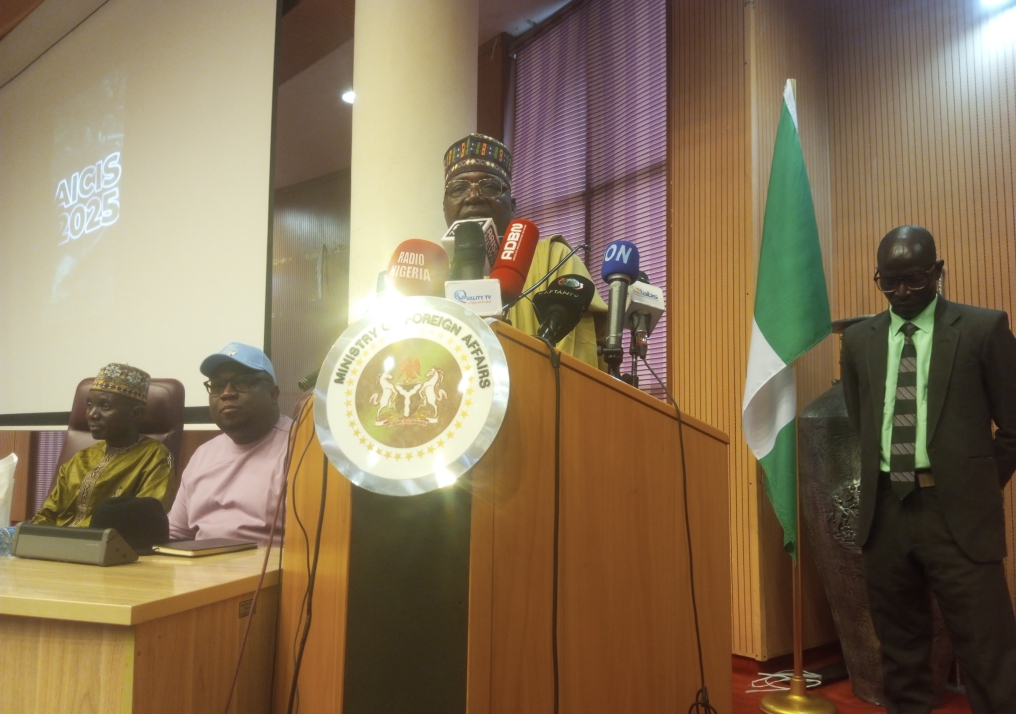Africa Must Be Positioned as Active Architect of Sustainable Development – SGF
By Raymond Enoch
The Secretary to the Government of the Federation (SGF), Senator George Akume, has declared that Africa must no longer be seen as a passive recipient in the global effort to tackle climate change and infrastructure deficits, but as an active architect of its own sustainable development. He made this statement—as delivered on his behalf by Engr. Nadungu Gagare, Permanent Secretary, Political and Economic Affairs, Office of the SGF—at the Stakeholders’ Engagement and Global Press Briefing for the upcoming Bi/Multilateral Africa Infrastructure & Climate Change Summit (AICIS) 2025, held at the Rotunda Hall of the Ministry of Foreign Affairs in Abuja.

The high-level event marked a key milestone in the lead-up to AICIS 2025, scheduled to take place later this year in Abuja. Organized by the Africa Business Ventures and Investment Group (ABVIG), in collaboration with the Office of the SGF, and the Federal Ministries of Foreign Affairs, Environment, and Women Affairs, the engagement brought together government officials, diplomats, development partners, media, and private sector stakeholders.
In the address, Senator Akume commended the visionary initiative behind the summit, highlighting the urgent need for Africa to design and drive its own path toward climate resilience and sustainable infrastructure. “The Summit is a timely continental platform to articulate, align, and activate collaborative strategies,” he said, emphasizing that Nigeria, under President Bola Ahmed Tinubu’s Renewed Hope Agenda, is prioritizing strategic infrastructure development, energy transition, environmental sustainability, and inclusive economic growth.
The SGF’s message also underscored the Federal Government’s full support for the Summit, describing it as “a clarion call to governments, the private sector, development partners, and the diplomatic community to align efforts, pool resources, and harmonize policies.” A notable highlight was the recognition of gender inclusion, with the Ministry of Women Affairs playing an active role—an affirmation that “no transformative agenda can be achieved without empowering women.”
Chairman of the AICIS 2025 Planning Committee, Hon. Moses O.T. Owharo, also addressed participants, setting the tone for the Summit’s broader mission. He explained that AICIS 2025 is structured around four core pillars: Green Infrastructure, Climate Resilience, Gender Inclusion, and Bankable Investment Partnerships.
According to Owharo, “This gathering is not just a press briefing; it is a strategic mobilization to ensure broad-based ownership of the Summit and reinforce stakeholder alignment.” He also stressed the continuity of efforts leading to AICIS 2025, referencing previous initiatives like the 2024 International Symposium on Green Financing in Abuja, and ongoing dialogues in Washington D.C. and West Africa.
Echoing President Tinubu’s call at COP28 for Africa to lead the climate discourse “with urgency, innovation, and collaboration,” Owharo urged all stakeholders to partner in ensuring that AICIS 2025 becomes a defining moment for Africa’s climate and infrastructure future.
As preparations intensify, both speakers called on multilateral and bilateral actors, civil society, and the private sector to transition “from ambition to action” in addressing the continent’s unique climate and development challenges.
AICIS 2025 is expected to attract heads of state, climate finance leaders, infrastructure investors, and international agencies, positioning Africa at the forefront of global climate resilience and sustainable investment.








